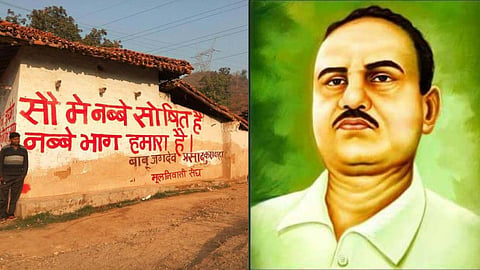
Babu Jagdev Prasad Kushwaha, scion of a Koeri family, was born on the 2nd of February, 1922, in a rural settlement of Jehanabad district, Bihar. His sire, a local primary school educator, raised him with steadfast values.
As he progressed through his formative years, Jagdev displayed a spirit of defiance, as evidenced by his youthful confrontations with upper-caste peers and a teacher. Despite these adversities, he persevered and achieved his matriculation in 1944 at the age of 22.
Subsequently, he pursued his tertiary education, obtaining a degree in Economics from Patna University in 1948, followed by a post-graduate degree in the same discipline in 1950.
Short stint with bureaucracy & journalism
Despite numerous challenges, Jagdev cleared the BPSC examination and secured a posting at the Bihar Secretariat. However, he was soon overtaken by disillusionment, leading to his resignation from the service after a mere few months in 1953.
Recognizing the crucial role of journalism in arousing the public consciousness, Jagdev took up the mantle of editing ‘Janta’, the organ of the socialist party. He later relocated to Hyderabad in 1956, where he served as the editor of two publications: Uday, a Hindi weekly, and Citizen, an English weekly based in Hyderabad. His writings were marked by a rebellious streak that troubled some influential individuals. Despite these pressures, he steadfastly upheld his principles and chose to resign rather than compromise his integrity.
Politics as a last resort
Upon his return from Hyderabad, Jagdev became an active participant in social movements, his oratory skills captivating the masses. Despite this, he was unable to secure victory in the 1957 and 1962 Lok Sabha elections, campaigned on a Socialist party ticket and faced financial difficulties which forced him to campaign on bicycle.
The year 1967 marked a turning point in Indian politics and social justice, as Jagdev's tireless efforts finally bore fruit. He joined the Sanyukt Socialist Party (formed through the merger of the Pragya Socialist party and the Sanyukt Socialist Party) and emerged victorious in the Vidhan Sabha election, running on the party's ticket.
This year was a seminal moment in the political landscape of Bihar, as the first non-Congress government was formed, with Mahamaya Prasad Sinha as Chief Minister. Babu Jagdev Prasad played a pivotal role in the establishment of this administration.
Paving his own way
Forging his own path, the government eventually fell and Jagdev founded his own party, the Shoshit Dal. In 1968, he formed a coalition government with the Congress, with advocates of social justice such as B.P. Mandal serving as Chief Minister, while Jagdev held the post of Minister of Irrigation and Power. Sadly, this government was short-lived, lasting only 50 days.During the period of 1969 to 1970, political instability was prevalent, and Jagdev served as Cabinet Minister for brief stints.
In the meantime, he visited the Soviet Union and was greatly influenced by Lenin. As a result, he earned the sobriquet of "Bihar Ka Lenin."
Joining forces with Arjak Sangh
The anti-Brahminical views espoused by Arjak Sangh, led by Ram Swaroop Verma, captivated Jagdev. In 1972, he merged his Shoshit Dal with Verma's Shoshit Samaj Dal to form the Shoshit Samaj Dal, with Verma as Chairman and Jagdev serving as General Secretary.
Through this new organization, Jagdev invigorated and empowered the marginalized masses of Bihar.
Final Days: Mysterious Demise
In May 1974, Jagdev campaigned against the Congress government, presenting six demands. He held numerous public meetings that inspired the masses and created unease among the government and feudal forces in the state.However, the government did not concede and Jagdev decided to escalate the movement, announcing a statewide satyagraha to protest his demands on September 5th, 1974.He was reportedly warned about a threat to his life in Kurtha, his birthplace, just two days before the planned satyagraha, but he laughed away the warning.
On the fateful day of September 5th, 1974, police officers shot the fearless leader on mere provocation. Reports suggest that the police force, allegedly comprised of upper-caste officers, then carried him to the police station where he was subjected to torture.
Unfortunately, Jagdev died from his injuries on the same day. His death remains shrouded in mystery.
The Messiah of social justice
Jagdev Prasad Kushwaha's death sparked widespread protests and outrage. Many believe that his death was a result of a conspiracy by the government and upper-caste policemen, who were threatened by his political and social activism. The police's justification that they had fired to disperse the violent mob was widely disputed. Kushwaha's famous slogan, "Pehli peedhi maare Jayenge Doosri Peedhi Jail Jayenge aur Teesri Peedhi Raj Karenge" (First generation will be killed, second generation will go to jail, third generation will rule") highlights the sacrifices and struggles of activists working towards social justice. On the occasion of his 101st birth anniversary, The Mooknayak pays tribute to Jagdev Prasad Kushwaha, the messiah of social justice.
You can also join our WhatsApp group to get premium and selected news of The Mooknayak on WhatsApp. Click here to join the WhatsApp group.